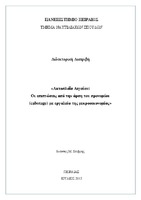Ακτοπλοΐα Αιγαίου: οι επιπτώσεις από την άρση του προνομίου (cabotage) με εργαλεία της μικροοικονομίας

View/
Subject
Cabotage ; Ναυτιλία ; Ακτοπλοΐα -- ΕλλάδαAbstract
Greece had to comply, till 01/01/2004, to European regulation 3577/92, so that to
waive the existing cabotage privilege to ships flying its flag. This was a common
situation with other European Countries (in South Europe) members of the E.U. By
this regulation a long transition period of 12 years has been granted so that this
industry to pass from a regulatory regime to free market. This took place partly in
2002 and fully in 2006.
The idea of this dissertation was to analyze the impact that Aegean Coastal System
will receive, passing from the state regulatory interference, partly in first instance and
fully later, to market forces. The contribution of this dissertation is basically its
microeconomic analysis of the basic characteristics of the Aegean Coastal System
before and mainly after its deregulation. The dissertation considered the “market” as
equivalent to a route. The impacts of waiving cabotage privilege were analysed one by one and step by
step, on: (1) the number of journeys and the number of ports served, (2) passengers
moved, as well as cars, (3) the number of ships and quality of the Aegean Coastal
System, (4) profitability of the ferry companies, (5) degree of utilization of ships’
space, (6) fares and tickets, (7) elasticities of demand and supply, (8) economies of
scale, (9) application of laws of demand and supply, (10) the degree of concentration
in individual routes and itineraries and (11) the degree of adequacy of the services
rendered to the islands.
Comparison is made with E.U. Coastal industry, and Air industry world wide, so
that to find out the influences of liberalization there and to test also the conclusions
reached for the Aegean Coastal industry. Our results showed that upon partial liberilization the number of itineraries as well
as the number of ports reduced slightly, passengers moved increased up to 2006 and
cars up to 2004, the fleet reduced, financial results improved (net profits), ship
capacity has been used less, average age of ships increased, economies of scale
continued to exist, but economies of scope have been reduced and fares and tickets
raised. Our proposal for the solution of the “problem of pricing” is to use "inventive"
pricing.
We carried out a field research. It showed that passengers prefer a reduced travel
time even at a higher fare. Money transfers are the most effective mean to redistribute
income for the “thin” lines (agones) in the Aegean. Most routes in Aegean
are oligopolies (duopolies) and monopolies. These duopolies follow the models of
Cournot, Bertrand and Stackelberg, as shown.
The relationship between industrial concentration and profitability of firms after
deregulation in not oneway, but it depends on the peculiarities of each market. Totally
the Aegean Ferry Market did not show correlation between the relevant variables i.e.
concentration and profitability. In particular markets (mainly Crete) correlation was
negative.
The laws of demand and supply as developed by theory and the assumption of
ceteris paribus advanced by economic theory, it has been shown that have no practical
value in the Aegean Ferry System. The good “services by the Aegean Ferry System”,
is normal good (not inferior) (covering a basic need). After deregulation, we have
higher value of the cross elasticity of demand between ship services and airplane
services and reduction of the price elasticity of supply. Suitable theoretical market
form after liberalization/ deregulation is proposed “workable competition”.


